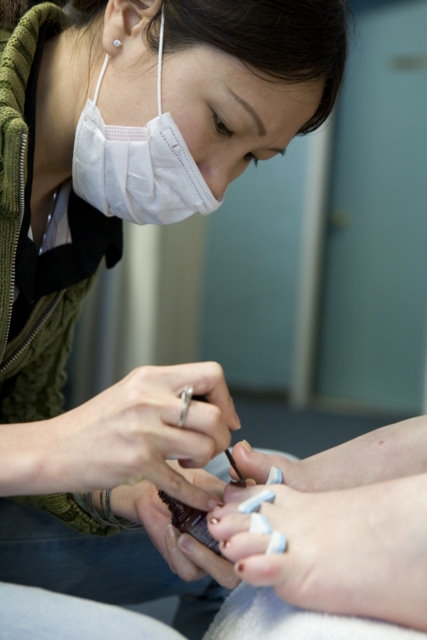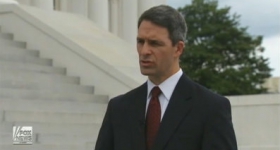Photo from haprev214's flickr
A new study from the CA Department of Toxic Substances Control shows that numerous nail care
products sampled in the San Francisco Bay Area are making false toxic-free claims. Twelve out of 25 bottles tested claimed to be free of at least one "toxic trio" chemical -- which are toluene, dibutyle phthalate (DBP) and formaldyde, and linked to respiratory illnesses, reproductive system damage, and cancer. Researchers found that 10 of the 12 products that claimed to be free of one of the toxins contained toluene, and four of those 12 contained high levels of DBP. Five of seven products that claimed to be three-free included one or more at significant levels. Some of the "toxic-free" products actually contained higher levels of DBP or toluene than products that did not claim to be safe.

Photo courtesy of the California Healthy Nail Salon Collaborative
In California alone, 48,000 people work in nail salons, the majority of who are Asian immigrant women of child-bearing age. In the US, there are an estimated 121,000 people who work in nail salons. (Go here to read the AP story, and here for the KQED Forum story).
Two of the manufacturers dispute the findings. From the AP story:
Mike Vo, vice president of Miss Professional Nail Products Inc., the maker of the Sation products and others on the list, said he disputed DTSC's findings.
"We will look at the report and challenge it," he said.
The DTSC found Dare to Wear polish contained small traces of toluene even though it was labeled as free of the chemical. Newton Luu, owner of LeChat Nail Care Products, which makes the polish, siad he had no idea where the toluene could have come from.
"We as a manufacturer do not use toluene in our nail polish, or any of those three," Luu said. "Perhaps the polish was contaminated through the lab tests or by some other method."
The 'greenwashing' of products is not an anomaly. Last year, a company making the Brazilian Blowout, a popular hair straightening treatment, labeled their product as formaldehyde-free. When state investigators tested the products -- because hair salon workers and customers were getting sick -- they found extremely high levels of the chemical, which is a known carcinogen. In January, CA Attorney General Kamala Harris issued a settlement and fined the company $600,000 (much of the state's ability to enforce proper cosmetic products labeling comes about because of the 2005 CA Safe Cosmetics Act).
Mislabeling is a serious issue, as consumers rely on such labels to make (mis)informed decisions. Nail salon owners are also buying these products in good faith, hoping to keep their workers (and often themselves, as owner-workers) safer. Julia Liou, co-founder of the CA Healthy Nail Salon Collaborative and public health administrator for Oakland, CA-based Asian Health Services calls this a "major public health problem." It affects millions of consumers, hundreds of thousands of workers, and "interferes with a salon worker's right to a safe and healthy work environment," she said in a statement.
For related Hyphen articles, check out an interview with Thu Quach, nail salon researcher; information about the San Francisco Healthy Nail Salon Recognition Program, and 'Mani-Pedis Go Green.'










Comments